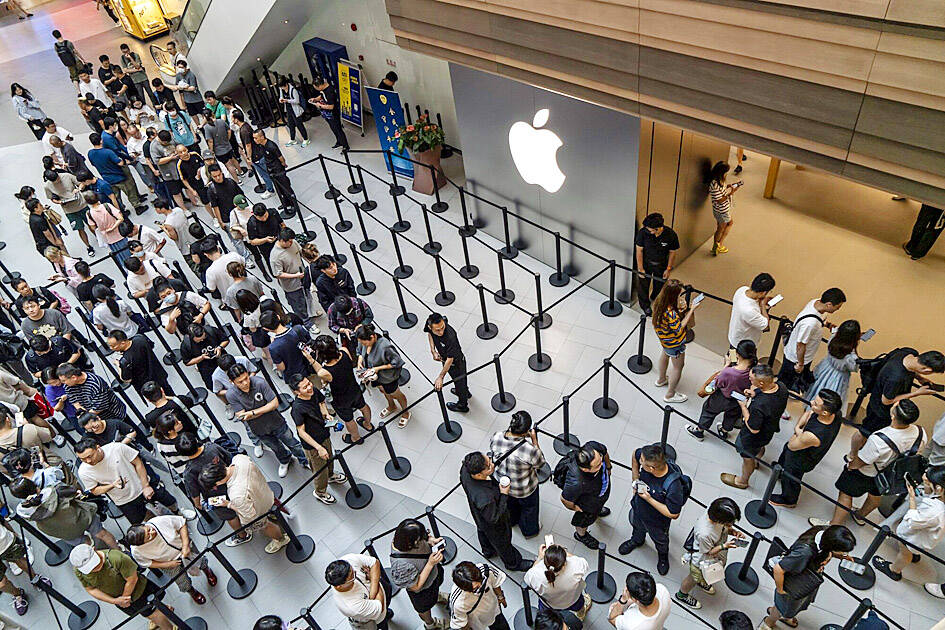Apple Inc is facing an unprecedented challenge: Persuading customers to buy its latest iPhones without their biggest new feature.
Apple yesterday launched the iPhone 16 lineup in almost 60 countries, including Taiwan, the US, China, India, Australia and South Korea. However, the device does not come installed with Apple Intelligence — the much-anticipated artificial intelligence (AI) software that the company has been touting since June. That means users would have to download the software features over time as they become available during the coming weeks and months.
That has put Apple in a tricky spot. It is already marketing the AI features heavily, but some consumers might hold off on buying the new phones if they cannot enjoy the benefits right away. The new iPhone hardware, meanwhile, has only modest upgrades from prior models. A touch-sensitive camera control button that makes it easier to take pictures and video is the most notable change.

Photo:Bloomberg
Even so, Wall Street remains bullish that Apple can accelerate its growth during the all-important holiday season. Analysts estimate that revenue would increase 8 percent in the fourth quarter — the best showing for that period since the end of 2021.
The new lineup includes two standard models — the 16 and 16 Plus — as well as the higher-end Pro and Pro Max. Preorders of the devices began last week, with shipments to stores and customers getting underway yesterday.
It is rare to see huge crowds of iPhone shoppers at Apple stores these days, but some diehard fans lined up at locations around the world ahead of the launch. The big question is whether ordinary consumers snap up the new model as well.
The initial units going on sale would run the iOS 18 operating system, but Apple Intelligence would require an over-the-air update to the iOS 18.1 software, which is launching next month.
Apple Intelligence was announced in June at the company’s Worldwide Developers Conference and has been available in a limited beta test for developers for the past several weeks.
Apple on Thursday released a public beta version of Apple Intelligence — one aimed at a wider audience — though most customers would not access it until the suite of features is released in its final form next month. Additional capabilities would not be ready until later, part of a staggered launch that would stretch into next year.
When the technology titan introduced the iPhone 16 line, it said that the devices were the first to be built “from the ground up” for Apple Intelligence. However, some iPhones from last year — the 15 Pro and Pro Max — would be able to support the features.
The look of the new phones is little changed from the iPhone 12 design from 2020. However, they feature noticeable battery-life improvements and camera advancements beyond the new button. Prices start at US$799 for the standard iPhone, ranging up to US$1,199 for the Pro Max.

With an approval rating of just two percent, Peruvian President Dina Boluarte might be the world’s most unpopular leader, according to pollsters. Protests greeted her rise to power 29 months ago, and have marked her entire term — joined by assorted scandals, investigations, controversies and a surge in gang violence. The 63-year-old is the target of a dozen probes, including for her alleged failure to declare gifts of luxury jewels and watches, a scandal inevitably dubbed “Rolexgate.” She is also under the microscope for a two-week undeclared absence for nose surgery — which she insists was medical, not cosmetic — and is

CAUTIOUS RECOVERY: While the manufacturing sector returned to growth amid the US-China trade truce, firms remain wary as uncertainty clouds the outlook, the CIER said The local manufacturing sector returned to expansion last month, as the official purchasing managers’ index (PMI) rose 2.1 points to 51.0, driven by a temporary easing in US-China trade tensions, the Chung-Hua Institution for Economic Research (CIER, 中華經濟研究院) said yesterday. The PMI gauges the health of the manufacturing industry, with readings above 50 indicating expansion and those below 50 signaling contraction. “Firms are not as pessimistic as they were in April, but they remain far from optimistic,” CIER president Lien Hsien-ming (連賢明) said at a news conference. The full impact of US tariff decisions is unlikely to become clear until later this month

GROWING CONCERN: Some senior Trump administration officials opposed the UAE expansion over fears that another TSMC project could jeopardize its US investment Taiwan Semiconductor Manufacturing Co (TSMC, 台積電) is evaluating building an advanced production facility in the United Arab Emirates (UAE) and has discussed the possibility with officials in US President Donald Trump’s administration, people familiar with the matter said, in a potentially major bet on the Middle East that would only come to fruition with Washington’s approval. The company has had multiple meetings in the past few months with US Special Envoy to the Middle East Steve Witkoff and officials from MGX, an influential investment vehicle overseen by the UAE president’s brother, the people said. The conversations are a continuation of talks that

CHIP DUTIES: TSMC said it voiced its concerns to Washington about tariffs, telling the US commerce department that it wants ‘fair treatment’ to protect its competitiveness Taiwan Semiconductor Manufacturing Co (TSMC, 台積電) yesterday reiterated robust business prospects for this year as strong artificial intelligence (AI) chip demand from Nvidia Corp and other customers would absorb the impacts of US tariffs. “The impact of tariffs would be indirect, as the custom tax is the importers’ responsibility, not the exporters,” TSMC chairman and chief executive officer C.C. Wei (魏哲家) said at the chipmaker’s annual shareholders’ meeting in Hsinchu City. TSMC’s business could be affected if people become reluctant to buy electronics due to inflated prices, Wei said. In addition, the chipmaker has voiced its concern to the US Department of Commerce